Great Lives - Button Gwinnett, roguish ironmonger who became a founding father of the US
This is the everyday story of an ironmonger's assistant from the West Midlands who went on to co-found the United States of America, had a county named after him, then lost his life following a duel with a political rival.
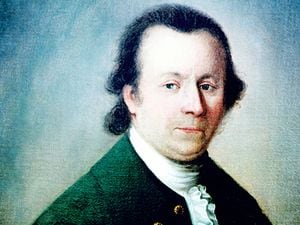
Due to the last incident, Button Gwinnett only lived to be 42, but you can't say it was a life short of adventure.
Perhaps if you go through life named after the fastening on an item of clothing, you are always going to stand out from the crowd. But Button Gwinnett, of Wolverhampton, was a man who was always going to make his mark on the world. A roguish, mercurial figure, there was no limit to his ambitions, even if he sometimes lacked the skill or experience to succeed at them.
Yet for a man who did so much to shape the world we live in today, remarkably little is known about his early life.
The son of Welsh vicar the Rev Samuel Gwinnett and his wife Anne, Button was probably born in Down Hatherley, Gloucestershire, sometime during March 1735. We say 'probably' because his birth was never registered, but his baptism was, at St Catherine's Church in Gloucester on April 10, 1735. Given that it was the custom to baptise children about a month after their birth, it is assumed he was born sometime about March 3 that year. The third of seven children, he had an older sister Anna Maria, and a brother Samuel, and it appears that his unusual first name was in honour of his godmother, Barbara Button.
Even the record of the baptism is cloaked in mystery. The original St Catherine's Church was demolished in 1650, and its replacement was not completed for another 200 years, so presumably the congregation of St Catherine's had been meeting at one of the neighbouring churches in the area at the time of Button's birth.
It is assumed he was educated at College School, which was based at Gloucester Cathedral, although again there was never any record of this – indeed, there are hardly any records of who attended the school between 1740 and 1748, although his older brother Samuel was registered as a pupil in 1739, so it seems likely Button would have followed suit.
But while his father held an MA from Glasgow University, and big brother Samuel went to Oxford, it appears that Button served his education at the University of Life. It is believed he initially went to work for his uncle, William Gwinnett, who kept a greengrocer's shop, before beginning an apprenticeship at John Weston Smith's ironmongery in Wolverhampton on May 2, 1754. Why he left his uncle's business, we don't know. It was certainly an unusual career move, particularly given that, aged 19, Gwinnett would have been considered rather long in the tooth to be starting an apprenticeship, at a time when such schemes were normally aimed at 14-year-olds.
Smith appears to have been quite a successful businessman from a wealthy family, owning considerable land resources in the Lower Penn area. It may well have been that the ambitious young Gwinnett may have wanted to gain first-hand experience from Smith about how to run a business.
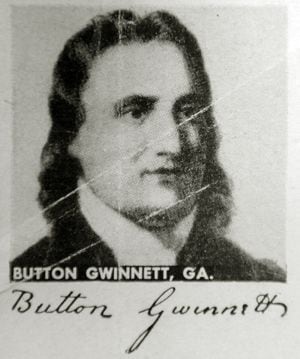
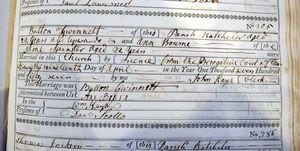
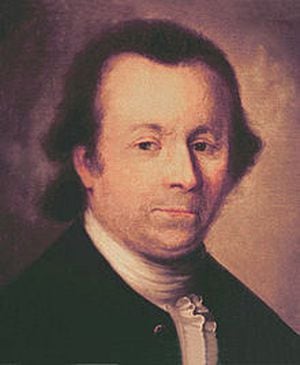
It certainly appears he had moved up in the world by April 12, 1757, when the 22-year-old applied for a licence to marry Ann Bourne, the daughter of a greengrocer. At that time, apprentices were not allowed to marry, so it is presumed he either completed his training or had moved on to other things. The couple were married on April 19 at the Collegiate Church of St Peter.
The couple began to lay down roots in the town, and Ann gave birth to three daughters. Amelia was baptised at St Peter's on February 27, 1758, followed by Ann who was baptised on May 14, 1759. It would be a difficult time for the Gwinnetts; Ann was not yet one year old when she died in December, 1759, and was buried in the churchyard of St Michael and All Angels in Tettenhall. Her older sister, Amelia, was four years old when she died in March, 1762, and was buried close to her sister. The couple could at least console themselves with the fact that by that time Ann Snr had given birth to a third daughter, Elizabeth Ann – known as Betsy – who was born in January, 1762.
It is not known how long Button carried on working for Smith the ironmonger, but it seems that by this time he had already decided his best route to riches laid in the emerging market of the American colonies.
And in 1762, still grieving from the loss of his two eldest daughters, Gwinnett emigrated to America to begin a new life, initially leaving his wife and surviving back home in Wolverhampton.
It probably helped that he had been left £100 – £24,000 at today's prices – in a legacy from his grandmother Barbara Button, after whom he had been named.
Gwinnett does not appear to have been a particularly successful businessman, and certainly not an ethical one. Liz Jack, a genealogist who is descended from Gwinnett, paints a picture of a sort of James Onedin-meets-Arthur Daley character, who used the proceeds of his shady dealings to further his influence in politics.
"He traded up and down the US east coast from Newfoundland to Jamaica," says Jack.
"His dealings always seemed to be dubious, he was good at borrowing money and not repaying it."
Records show that in January, 1764, Gwinnett, along with Matthias Neale, was the part-owner for a 60-ton ship called Recovery, which had a crew of five but no guns. That year, the ship carried ballast from Havana, in Cuba, to Bridgetown in Barbados, under its master, John Mills.
In 1765, he settled in Savannah, Georgia, where he kept a grocery shop. It appears once more that his aspirations exceeded his wherewithal, and later that year his career took an abrupt change in direction when he sold his shop and decided to try his hand as a plantation owner. Dazzled by visions of a planter's life on a great estate, he had little capital, no experience, and no training in how to run a plantation. Undeterred he borrowed £3,000 – about £545,000 today – to buy the lease of St Catherine’s Island from the Rev Thomas Bosomworth. The plantation was ideally situated near to the busy mainland port of Sunbury, but Gwinnett was clearly out of his depth by this time.
Already deep in debt, he doubled down and purchased coastal lands on credit, and received grants of others from the colony, also buying large numbers of slaves to work his holdings. Poachers aggravated his problems by raiding the island's livestock.
Gwinnett had also acquired sole ownership of a 60-ton ship called The Nancy, which was again 60 tons, with no guns but, this time, it had a crew of eight, and travelled between Florida, Georgia and Antigua, delivering cargoes of groceries, medicines, tobacco and timber. But when The Nancy left Savannah for Bristol on June 25, 1767, it had a new owner, British-based John Powell, and it is thought to have been confiscated from Button Gwinnett to pay for his debts.
Button’s wife, Ann, visited in 1767, but on seeing that her husband was living in a house built out of compressed shells and mud, returned home after a year.
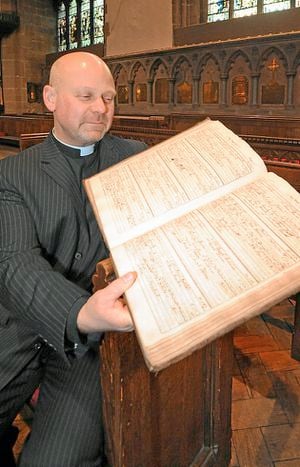
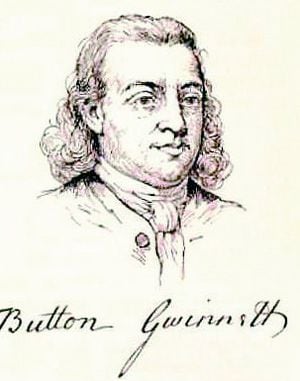
Gradually, Gwinnett's creditors ran out of patience, and progressively took over his portfolio. In April 1770, Anthony Lamotte placed a warning notice in the Georgia Gazette, stating that he had purchased the Barber Islands from Gwinnett, but not received the documentation – and feared that Button was trying to illegally sell them to somebody else. The same year he leased St Catherine’s Island to Edward Mease, although he was allowed to maintain a home on the island, which he did for the rest of his life.
But while Gwinnett's foray into real estate may have been a disaster, both financially and ethically, it also gave him a route into politics. As a landowner, he was entitled to both vote and stand for election. In 1768, Button was appointed a magistrate, and was then elected to the colonial Commons House of Assembly for the parish of St John’s in Savannah, but his attendance was somewhat patchy due to his financial woes.
Mindful of his close ties to England, Gwinnett did not become a strong advocate of colonial rights until his hand was forced by the War of Independence in 1775. The same year, St John's Parish, which encompassed Gwinnett's lands, threatened to secede from Georgia because of the colony's reluctance to back the independence movement.
Having been appointed as Georgia's representative on the Continental Congress, he voted in favour of the Declaration of Independence, adopted by Congress on July 4, 1776. He is the second signatory on the famous parchment copy. In 1777 he wrote the original draft of Georgia's first state constitution, and became Speaker of the Georgia Assembly until, on the death of Archibald Bulloch, and in March that year Gwinnett was promoted to the role of acting President – or governor – of Georgia.
But it was a petty feud, and his desire to take on another role he was hopelessly unqualified for sealed his fate.
While Gwinnett had proved to be much more adept as a politician than as a businessman, he was still not happy, and decided he wanted to be a military leader. When, during Gwinnett's time as Speaker, his old rival General Lachlan McIntosh was appointed leader of the Georgia Brigade of Rangers, Gwinnett was furious. It was a position he had been desperate to hold, despite having no military experience whatsoever.
So Gwinnett took every opportunity he could to undermine McIntosh, and when he became acting state president, Gwinnett effectively became commander-in-chief of the army.
Liz Jack says: "In his position as Speaker, Button was able to re-structure the militia, removing those he did not like and thus weakening its ability to fight effectively. This did nothing to improve the relationship between Button and Lachlan. The situation continued to fester."
Tensions between Gwinnett and McIntosh reached boiling point in April, 1777, when Gwinnett, just weeks into his role as state president, used his position to order an attack on British Florida, against McIntosh's wishes.
The Florida expedition resulted in a humiliating defeat, and stoked up the tensions between Gwinnett and McIntosh, who blamed each other. Gwinnett had also had McIntosh's brother George arrested for smuggling and treason – he was later acquitted – and even Gwinnett's supporters were becoming increasingly aware of his character flaws.
On May 8, John Treutlen was appointed to replace Gwinnett as Governor of Georgia. The following week, in front of the whole assembly, McIntosh called Gwinnett "a scoundrel and a lying rascal!" prompting Gwinnett to challenge McIntosh to a duel. After hurriedly drafting out a will, the two men met with one supporter each, just before sunrise the next morning.
The duel took place at dawn on May 15, 1777, just outside Savannah, the two men standing 12ft apart. On the instruction to fire, Gwinnett shot McIntosh in the thigh, but his foe remained standing. Gwinnett's leg was fractured above the knee, and he fell to the ground. McIntosh asked Gwinnett if he wanted another shot, to which he replied "yes", but the two men's supporters declared that enough blood had been shed and that the duel was over. Both men were declared to be gentlemen, and the pair shook hands. But while McIntosh recovered from his wound, Gwinnett's became gangrenous, and he died on May 27. While McIntosh and Gwinnett's wife Ann both blamed Gwinnett's doctor for his death, Gwinnett's political allies Dr Lyman Hall and Joseph Wood were less forgiving, demanding that McIntosh went on trial for murder. After being acquitted of the charge, McIntosh was ordered to leave Georgia, and was transferred to serve George Washington in Pennsylvania.
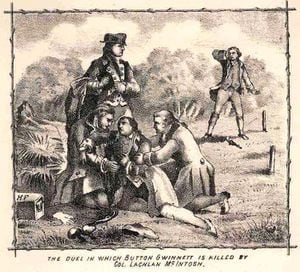
Gwinnett is believed to be buried at Colonial Park Cemetery in Savannah, and Gwinnett County in Georgia, near the state capital Atlanta, was named after him.
Only 51 examples of Gwinnett's signature are known to exist, and unsurprisingly, most of these were for IOUs. But given that one of his signatures changed hands for £495,000, it might be said that his creditors didn't get such a raw deal after all.
The register of Gwinnett's marriage to Ann at St Peter's Church is now, understandably, kept in the vaults of an unnamed bank in Wolverhampton.
